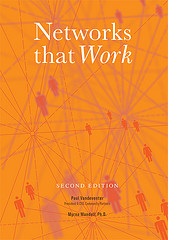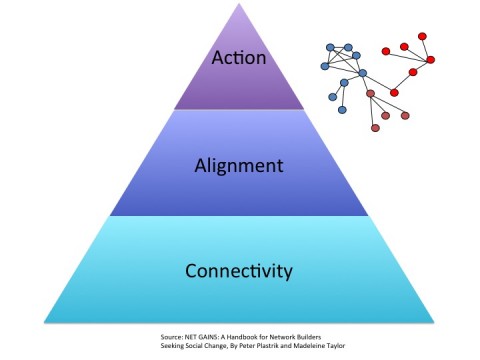Tag Archive: diversity
February 18, 2014

8/14/14 Update: Sadly the list of names in this post has grown in the past week with the deaths of Eric Barnes and Mike Brown. In both cases it appears that aggressive policing of minor offenses escalated, resulting in deaths that did not need to happen. #blacklivesmatter
I find the fact that we need a conversation called #BlackLivesMatter disturbing. But it’s a badly needed conversation and one that needs to catalyze effective action. It’s urgent that we create a context where it’s no longer “understandable” that someone could be afraid enough of an unarmed black person to justify killing him or her.
Read More
January 2, 2014

For those who read this blog on a somewhat regular basis, you know that we at IISC find and experience great promise in embracing network approaches to (and as) social change. So what happens when we truly see ourselves as and in networks; that is, appreciating how we are inextricably embodied through and embedded in interconnected flows of energy, material goods, ideas, intentions, etc.?
Ten thoughts, in no particular order, nor meant to be exhaustive: Read More
December 12, 2013
 Over the past five years or so of supporting self-declared “networks” for change, I have evolved in my understanding of what is new when we call something a network, versus a coalition or collaborative or alliance. On the surface, much can look the same, and one might also say that coalitions, collaboratives and alliances are simply different forms of networks. Yes, and . . . I believe that what can make a big difference is when participants in a network (or an organization, for that matter) embrace new ways of seeing, thinking, and doing. So let me propose that network approaches at their best call on us to lead with some of the following: Read More
Over the past five years or so of supporting self-declared “networks” for change, I have evolved in my understanding of what is new when we call something a network, versus a coalition or collaborative or alliance. On the surface, much can look the same, and one might also say that coalitions, collaboratives and alliances are simply different forms of networks. Yes, and . . . I believe that what can make a big difference is when participants in a network (or an organization, for that matter) embrace new ways of seeing, thinking, and doing. So let me propose that network approaches at their best call on us to lead with some of the following: Read More
December 11, 2013

I’ve spent time the past week reading through Networks that Work, a handy and concise resource for developing organizational networks, written by Paul Vandeventer, President and CEO of Community Partners, and Myrna Mandell, Ph.D. The book lays out some very helpful pointers for more formally constructed networks. I have highlighted 10 points below that resonate with our experiences at IISC around supporting organizational networks for social change. My comments and extensions are in italics: Read More
December 4, 2013
“Ultimately if we are to avoid failure in the most critical work of this century, the deepest reaches of our beings must be brought to bear in honestly reevaluating and shifting the most basic structures of our society.”
– john a. powell

The following is a textual recapturing of a Pecha Kucha-like presentation that I gave at an ARNOVA Pre-Conference Session in Hartford, CT two weeks ago. This was part of a 3-hour interactive conversation, co-designed and facilitated with Dr. Angela Frusciante of the William Caspar Graustein Memorial Fund, focusing on the power of networks for learning and social change, primarily with academic researchers and philanthropists.
At the Interaction Institute for Social Change, we are in agreement with Professor john a. powell when he points to the need to consider and make fundamental structural changes in our country and communities for the causes of greater social justice and sustainability. Read More
October 16, 2013
“Creating a culture of trust in a network can have a big payoff. Why is this so? First, when trust is well-developed in a network, people are willing to get involved in high-risk projects where their reputation and resources are at stake. These kinds of projects usually have a lot of impact. Next, high levels of trust usually make decision making easier and less time consuming. Finally, a culture of trust enables people to accept and work with people who are quite different from them, which increases the number of people working on network activities.”
– June Holley, Network Weaver Handbook

|Photo by Mike Baird|http://www.flickr.com/photos/72825507@N00/6827018401/in/photolist-bphfHP-ayA7wy-bKZzec-e4iaNi-aaixFs-bKZArr-e58faj-e52zee-e58ah1-e5838j-e586eo-e58cR5-e584Hq-8Wcf9Q-csNfzU-dftPtq-dZTbw9-bWm4ku-d6vnvU-d6vg8U-awDsBx-dz9vRu-7CW4pj-acYjbQ-agyEHk-9XrqN1-9XouvF-9XowsD-9XrpRj-9XrorW-d6vBWJ-d6vpE5-d6vFUQ-d6voKN-d6vJaN-d6vuLJ-d6vRoQ-d6vUZW-d6vxbE-d6vDLf-d6vSBq-d6vvPL-d6vWoA-d6vXLJ-d6vybf-d6vqN1-d6vQrY-d6vGTA-d6vma9-d6vzeb-d6vKqG|
The importance and power of trust in networks for social change cannot be overstated. Time and again, and despite what might show up as initial resistance, being intentional about getting to know one another beyond titles, official positions, and transactional exchanges reaps tremendous benefit, for all the reasons June Holley mentions above and more. Taking time and making space to build trust helps people to do the important work of social change and is in many cases an embodiment of the change we are trying to make in the world – when we expand our circles of compassion and inclusion; when we create new patterns of opportunity, exchange and resource flows; when we see and validate previously unrecognized or undervalued assets.
Read More
September 15, 2013

The following post is part 2 of a 2 part series on some collaborative tools and strategies to help us change our selves, change our organizations and change the world. We hope you find it helpful. We encourage you to join the conversation!
We are compelled by a quote from Theory U, attributed to William O’Brien “The success of an intervention depends on the interior condition of the intervener.” Collaborative tools and strategies are only truly useful in the hands of practitioners whose hearts are big enough to hold the complexities, struggles, hopes and fears that accompany the work of transforming racism. Read More
September 8, 2013

The following post is part 1 of a 2 part series on some collaborative tools and strategies to help us change our selves, change our organizations and change the world. We hope you find it helpful. We encourage you to join the conversation!
We are compelled by a quote from Theory U, attributed to William O’Brien “The success of an intervention depends on the interior condition of the intervener.” Collaborative tools and strategies are only truly useful in the hands of practitioners whose hearts are big enough to hold the complexities, struggles, hopes and fears that accompany the work of transforming racism. Read More
August 26, 2013

We partnered with a foundation as they built a network of leaders who shared a deep passion for their city. In the beginning, many of the leaders wanted to do something together quickly. We encouraged them to pause, build deeper relationships, and see what emerged. Read More
August 20, 2013

The following pst has been reblogged from our dear friend Adrienne Maree. We hope you enjoy it as much as we did.
Adrienne Maree Brown outlines core principles to live by. I find these powerfully resonant and I continue to invite us into greater intentionality in our practices for creating a new world. Read More
August 16, 2013

We worked with a national network of mostly white social change activists. We supported members of the network to increase the number of people of color at their annual gathering from 5% to 40% in a single year. Read More
July 29, 2013

We facilitated a network focused on improving early childhood education and care. The initial focus was to build leadership capacity and facilitate strategy development with stakeholders across a state to design a more holistic statewide structure for decision-making related to early childhood. Read More


 Over the past five years or so of supporting self-declared “networks” for change, I have evolved in my understanding of what is new when we call something a network, versus a coalition or collaborative or alliance. On the surface, much can look the same, and one might also say that coalitions, collaboratives and alliances are simply different forms of networks. Yes, and . . . I believe that what can make a big difference is when participants in a network (or an organization, for that matter) embrace new ways of seeing, thinking, and doing. So let me propose that network approaches at their best call on us to lead with some of the following:
Over the past five years or so of supporting self-declared “networks” for change, I have evolved in my understanding of what is new when we call something a network, versus a coalition or collaborative or alliance. On the surface, much can look the same, and one might also say that coalitions, collaboratives and alliances are simply different forms of networks. Yes, and . . . I believe that what can make a big difference is when participants in a network (or an organization, for that matter) embrace new ways of seeing, thinking, and doing. So let me propose that network approaches at their best call on us to lead with some of the following: 







